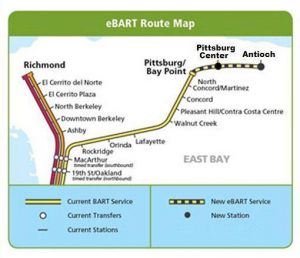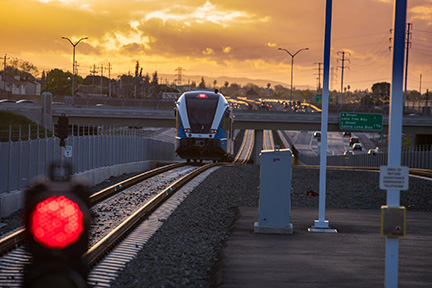The wait is almost over for East County residents. BART to Antioch will open for passenger service on Saturday, May 26, 2018.
To celebrate, BART will hold a community ribbon-cutting celebration on Friday, May 25, 2018 at 11 a.m. at the new Antioch Station featuring free preview train rides and local entertainment.
The BART to Antioch extension will begin carrying riders in East Contra Costa County on Saturday, May 26, 2018.
To celebrate, BART will be hold a community ribbon-cutting celebration on Friday, May 25, 2018 at 11 a.m. at the new Antioch Station featuring free preview train rides and local entertainment.
The new service between the Pittsburg Bay Point Station and Antioch is 10 miles long, adds two new stations, and provides much needed congestion relief on State Route 4.
New service is fast, clean, and comfortable
 The service between the Pittsburg/Bay Point Station and Antioch is 10 miles long and adds two new stations. The extension will be able to carry an estimated 2,400 people in each direction, per hour, during rush hours.
The service between the Pittsburg/Bay Point Station and Antioch is 10 miles long and adds two new stations. The extension will be able to carry an estimated 2,400 people in each direction, per hour, during rush hours.
“This is a new dawn for transit in this part of the Bay Area,” said BART Director Joel Keller, who serves East Contra Costa County and led efforts to bring the extension to the region. “Making this visionary project a reality took the long-term dedication of East County residents, and the commitment of many local, regional, state, and federal leaders.”
BART to Antioch is part of the Highway 4 Widening Project, which expanded Highway 4 between Pittsburg and Brentwood. The combined project was designed to bring commute relief as soon as possible with minimal disruption to the traveling public.
The $525 million cost of the extension is about half of the $1 billion cost estimated for extending BART’s traditional electric-powered line.
Quiet DMU trains offer a smooth ride
The extension marks the first time BART is using Diesel Multiple Units or DMU train cars. They meet the US Government’s strictest emissions standards and use renewable diesel from hydrogenated vegetable oil.
The DMUs run on their own tracks in the median of State Route 4 and connect with the existing BART system at a Transfer Platform just outside of the Pittsburg/Bay Point Station.
The trains boast a variety of amenities including digital signs, automated audio announcements, and modern climate control systems for those hot summer months.
Two new stations
The new Pittsburg Center Station is located at the Railroad Avenue overpass of Highway 4 in Pittsburg. The new Antioch Station is located at 1600 Slatten Ranch Road in Antioch. Learn more about the stations and service in our FAQ.
Schedule
The BART to Antioch schedule has been incorporated into our Quick Planner, which can be found on the bart.gov homepage. For schedules by line or by station, use a date of May 26, 2018 or later
Community celebration open house
The public is invited to share the excitement with us at a ribbon-cutting ceremony on Friday, May 25, 2018 at 11 a.m. at the Antioch Station. Free preview train rides will be provided all day and into the evening.
WHAT: Public celebration of the opening of BART to Antioch.
- There will be no BART service to event.
- Attendees will get free rides on the line’s new environmentally-friendly Diesel Multiple Unit (DMU) train.
- The rides will start in Antioch and will end at the Transfer Platform in Pittsburg.
- They will not stop at Pittsburg Center Station until after 3pm and will not connect to the main BART system.
- BART’s new Fleet of the Future train cars will be at the transfer platform for tours, but will not disembark.
WHERE: Antioch BART Station, 1600 Slatten Road
East of Hillcrest Avenue exit off Highway 4
WHEN: Friday, May 25, 2018
Ribbon cutting ceremony 11am-Noon
Free public train rides 1pm-8pm
SPEAKERS will include BART General Manager Grace Crunican, BART Board members and regional elected officials and transportation leaders.
Entertainment provided by the Pittsburg High School Jazz Combo and the Antioch High School Music Masters


11 comments
This took forever. Still dont understand why BART decided to use these little mini trains as opposed to extending the end of the line for the existing trains.
Especially when east county residents have been paying for the real BART for decades.
Nice to see ex-mayor Keller looking out for Antioch. Now ask him where all the money Antioch has been paying for Bart since 1964 went.
Keller’s term is up 12/2018; vote in a new Director for the BART Board to represent Contra Costa County. I those trains are only two cars too! Parking spots are way too small at Antioch; stations are horrible because none of them are like regular BART stations; they are the bare minimum. In bad weather, I don’t think it will be fun.
Ahhh thank you GM, Firestone, Phillips and others for destroying the electric rail cars of old and replacing them with miles of pavement we now get stuck in traffic in! It’s a depressing part of history what they did to corrupt a beautiful thing that could’ve been.
I find it very interesting that San Jose will get the real BART before east county residents. I believe that’s where the money collected in east county was diverted. Joel Keller you should be ashamed of yourself, how dare you settle for this pathetic alternative. The residents of east county have been paying for this extension for too many years to end up with this pathetic e-bart!!
Thank you for your comments. The residents of Contra Costa, Alameda and San Francisco counties have supported the BART system since 1959 when property taxes were levied o fund system planning, and later construction and operations. The State Legislature passed a sales tax in the three counties to provide additional funding for construction, and in 1976 sales tax began to be used for operations. The voters of the three counties have supported three general obligation bond measures since 1969. The first in 1969, was for $790 million and was used to construct the original system. Those bonds were fully paid off in 1999 and the obligation was removed from the tax rolls. The two additional bond measures, Measure B (earthquake safety retrofit) and Measure RR (Rebuild BART) were both passed with 2/3’s voter support and the funds are being used to strengthen the system and rebuild the aging infrastructure. In 2000, BART completed an analysis of estimated property and sales tax revenues generated from the cities of Antioch, Brentwood, Brentwood and Pittsburg (Oakley was not an incorporated city prior to 1999) and the study revealed that the area had generated a total of $103 million. Since the opening of the core system in 1972, the Concord line has been extended to North Concord/Martinez (1994) and Pittsburg/Bay Point (1996) (without this $490 million extension, the current 10.1 miles $525 million rail extension (2018) would not have been possible.
Santa Clara County has passed three sales tax measures to pay for the construction, operations and maintenance of the extension to San Jose.
2000 Measure A
On August 9, 2000, the Santa Clara Valley Transportation Authority (VTA) Board of Directors voted to place a 30-year half-cent transit sales tax on the November 7, 2000 General Election ballot, giving Santa Clara County voters the opportunity to vote on transportation improvements in the county including construction of a BART Extension from Alameda County to Santa Clara County.
Measure A was approved by 70.3 percent of the voters and collection of the tax began in April 2006 to help fund design and construction of the BART Silicon Valley project.
2008 Measure B: Operation and Maintenance Funding
On November 4, 2008, an additional Santa Clara County ballot measure supporting the BART extension passed, receiving 66.78% of the vote, exceeding the two-thirds super majority. The 30-year eighth-cent Measure B sales tax will generate dedicated revenue to fulfill VTA’s obligation to BART for the operation, maintenance, and future capital reserve of the extension VTA constructs.
2008 Measure B stipulated that collection of the eighth-cent sales tax begin when federal and state funds were secured. Federal funds were considered secured and matched at the time VTA received a $900 million Full Funding Grant Agreement in March 2012. Collection of the eighth-cent sales tax began on July 1, 2012.
2016 Measure B
In June 2016, the VTA Board of Directors unanimously adopted the framework and funding amounts to place an additional ½-cent 30-year sales tax measure on the November 8, 2016 ballot to help fund transportation priorities. An extensive 18-month public outreach process gathered input and suggestions on how to best improve the transportation needs of Santa Clara County. Through this process, a list of categories and transportation projects was approved, including a plan to invest $1.5 billion in Phase II of the BART Silicon Valley Extension. Measure B, which required a two thirds majority vote, was approved by voters by more than 71 percent of the vote and becomes effective in April 2017.
At the time of the planning of the BART to Antioch extension there was approximately $502 million available for the construction of a project. The DMU (Diesel Multiple Unit) that was unanimously selected by the ECCPAC (an appointed body from the cities of Antioch, Brentwood, Oakley and Pittsburg, the County and BART) as the preferred alternative. The cost of the LRV (Light Rail Vehicle) was $521 million and of BART was $1.173 billion. Since the LRV and BART Extension Alternatives could not be funded with available resources, pursuing those alternatives would require securing additional funding sources, thus delaying rail service in the corridor. A BRT (Bus Rapid Transit) ($393 million) was considered, but rejected by the local leadership as not meeting the needs of the area. It was important that BART make a decision about the preferred alternative because of the scheduled widening of SR4 being undertaken by Caltrans and CCTA. If the Proposed Project were delayed, the motoring public and residential and commercial uses along SR 4 would be heavily impacted since the construction for the SR 4 widening would occur, followed by a second disruption shortly thereafter for construction of the Proposed Project.
Congrats to the 10 commuters that will actually use this, what a joke!
10 commuters? LOL! You obviously have never commuted on BART to/from east county. Better add a few zeros on the end of that.
Years late, but better late then never. Typical part efficiency.
Comments are closed.